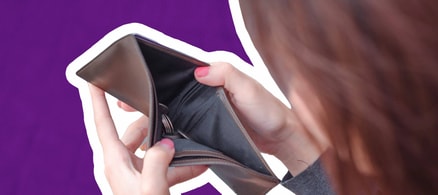What is good debt?
Good debt consists of inexpensive loans that help you build wealth. This may seem simple, but the devil is in the details. Good debt can quickly turn into bad debt if you don’t use it wisely.
Student loans
According to the Fed’s Economic Well-Being of U.S. Households report published last month, 30% of adult Americans take on debt to pay for their education.
Without student loans, a university education would be out of reach for many students. And since higher education leads to higher lifetime earnings, student loans are typically considered good debt.
In a perfect world, this is true. But not all majors lead to higher-paying jobs. And we all know someone who accumulated mountains of student debt for a degree they never used.
Student debt is only good debt if it unlocks greater earnings.
More: What is debt consolidation and will it really help?
Mortgages
Mortgages are often considered good debt because you’re paying for an appreciating asset. If the rate of appreciation outpaces your loan payments, insurance, and taxes, you essentially live rent-free.
The problem is, appreciation isn’t guaranteed — just ask anyone who financed a home they couldn’t afford right before the Great Recession.
If you buy in an overpriced market or a deteriorating neighborhood, your home value could tank, making your loan more expensive than the property’s worth. And if you financed with an adjustable-rate mortgage, your rates could increase, leading to unaffordable monthly payments.
To be sure you’re taking on good debt with a mortgage, you need to understand exactly what you’re getting into.
Home equity loans and HELOCs
Home equity loans and HELOCs allow you to borrow against the equity you’ve built in your home. Since you’re putting up your home as collateral, rates are lower than unsecured loans.
If used for wealth-building purposes like home renovations, a business, or real estate investments, home equity loans and HELOCs are good debt. But if you put your primary residence at risk to finance a new Mercedes that instantly loses 10% when driven off the lot — bad debt.
More: Types of mortgage loans
Business loans
In business, you need to spend money to make money. If a business loan leads to more money, it’s considered good debt.
But similar to student loans and mortgages, things don’t always go according to plan. The latest data says 1 in 5 new businesses in the U.S. fail within a year, and if your business goes under, that business loan debt does more harm than good.
Buy now, pay later programs
Buy now, pay later programs (BNPL) are point-of-sale installment loans. You make a small upfront payment for a product, then pay off the rest with predetermined installment payments, usually without interest.
A zero-interest loan may sound like a no-brainer, but it depends on what you’re purchasing.
If your purchase helps you build wealth — like a laptop to start a freelancing side hustle — buy now, pay later plans can be a tool to boost cash flow.
But the accessibility of BNPL has downsides that could get you stuck in debt quickly. If it’s for a cushy resort in the Maldives that your future self will struggle to pay off, that’s bad debt.
Kiss Your Credit Card Debt Goodbye
Having a single loan to pay off makes it easier to manage your payments, and you can often get a better interest rate than what you might be paying on credit cards and car loans.
Fiona is an online marketplace offering personalized loan options based on your unique financial situation.
When you consolidate your debt with a personal loan, you can roll your payments into one monthly installment. Find a lower interest rate and pay down your debt faster today.
Get StartedWhat is bad debt?
Bad debt includes expensive loans that move you towards a worse financial position. But if used responsibly, bad debt isn’t always as evil as it seems.
High-interest credit cards
The Consumer Financial Protection Bureau estimates that Americans shell out $120 billion per year in credit card interest and fees. The convenience of credit cards makes it easy to go overboard, and with average APRs over 16%, holding a balance is an expensive form of debt.
That said, if used responsibly, high-interest credit cards can turn into one of the best types of debt.
If you pay off your balance in full each month, a credit card is essentially a free short-term loan that builds your credit score. And if you use a good rewards or cash-back card, you can even get paid to take these short-term revolving loans.
Auto loans
Auto loans may be cheaper than personal loans, but that doesn’t necessarily make them good debt. Apart from pandemics and chip shortages, vehicles drop in value over time.
That means you not only lose money on interest payments, but also in depreciation.
That said, there are exceptions. An auto loan could be considered good debt if you can’t afford to buy a car with cash, don’t have other better loan options, and need a vehicle to drive to work.
Payday loans
Payday loans are short-term loans that are due on your next payday, and they’re extremely expensive — over 600% in some states when calculated on an annual basis.
There’s really no bright side when it comes to payday loans. They’re as bad as debt gets and only should be used when you’ve exhausted all your other legal options and in the most dire of circumstances.
More: Debt isn’t necessarily the enemy of a comfortable retirement
How do these debts affect your credit score?
Any type of debt reported to the national credit bureaus affects your credit score — for the better or the worse.
Consistent on-time payments boost your score, while late payments send it down the drain. Successfully juggling a mix of different debt types — like revolving and installment loans — shows lenders you are responsible and creditworthy.
Opening credit cards and taking on new loans usually require a hard inquiry on your credit report, which can temporarily ding your credit score. The long-term effects of new accounts depend on how they affect your credit utilization ratio — the percentage of your total line of credit that you use.
For example, if you open a credit card with a $10,000 credit limit and only use a small portion of that $10,000, it would lower your credit utilization and push your score up.
Student loans, auto loans, mortgages, and credit cards are all reported to the credit bureaus. BNPL programs are sometimes reported, and payday loans generally are not. That said, even though they don’t show up on your credit report, they can indirectly affect your credit score by making it harder to afford your other debts.
Stop overpaying for home insurance
Home insurance is an essential expense – one that can often be pricey. You can lower your monthly recurring expenses by finding a more economical alternative for home insurance.
SmartFinancial can help you do just that. SmartFinancial’s online marketplace of vetted home insurance providers allows you to quickly shop around for rates from the country’s top insurance companies, and ensure you’re paying the lowest price possible for your home insurance.
Explore better ratesTips to pay off debt
To pay off debt, you need a solid strategy. If you haven’t already, consider:
Consolidating. Simplify your unsecured debts by rolling them together into one personal loan, HELOC, or zero-interest credit card. Strategizing. Choose a strategy to pay off your debt — like the avalanche method or the snowball method — and stick to it. Asking for help. If you’re struggling to stay afloat, reach out to your lenders as soon as possible to discuss your options.
There’s a lot of gray area when it comes to good and bad debt, and the difference often comes down to what you’re using the money for and your alternative options.
Ask yourself — will this debt improve my future financial situation? Or make it more difficult?
Sponsored
Follow These Steps if you Want to Retire Early
Secure your financial future with a tailored plan to maximize investments, navigate taxes, and retire comfortably.
Zoe Financial is an online platform that can match you with a network of vetted fiduciary advisors who are evaluated based on their credentials, education, experience, and pricing. The best part? - there is no fee to find an advisor.







